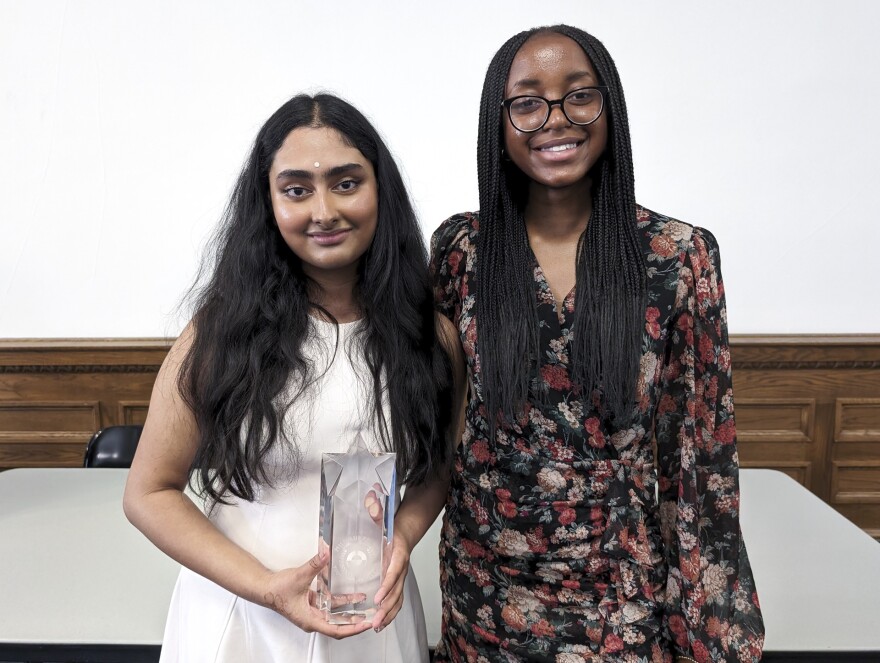Milwaukee’s youth poet laureate knows how intimidating it can be to put pen to paper.
Aleena Ahmed, a Bengali American poet and a junior at Nicolet High School, was selected last summer by Woodland Pattern, a nonprofit book center and performance space, to help students overcome that fear and spark creative writing.
Milwaukee County high school freshmen, sophomores and juniors have until March 30 to apply to be the next youth poet laureate. The selected poet will receive a $500 book allowance and a paid summer internship with Woodland Pattern. They will also receive mentorship and performance opportunities through the book center.
Lake Effect’s Xcaret Nuñez spoke with Ahmed about what inspired her love of poetry and her experience as the 2024-2025 Milwaukee Youth Poet Laureate.
This interview has been edited and condensed for length and clarity.
I understand that you have an appreciation of art in various forms, but what do you love most about poetry that keeps you connected to it?
I think poetry has the ability to capture emotions and ideas in a way that's so accurate and so personal in a way that prose can't. I think because of that, [poetry] has this really unique capacity to connect people together. There have been times when I will be reading the work of somebody else, or I'll be hearing work from somebody else, and it just strikes me right in the heart, and I'm just in awe of what I just heard because of how personal it is. I think that's why it's so important — the emotion [in poetry]. Because you're able to use so many different literary techniques, and it's so precise and so interpretational. And in that way, I think all the time, everybody has something to gain from a poem — because it means something different for everybody.
Is there anything in particular that influences your work?
I think for me, it's definitely my culture and my upbringing, 100%. It always shows up in my work in some way, shape, or form — whether it's the scents I grew up with or the environment I grew up with — the nature, the flowers, like any part of my culture. Somehow it just always creeps up into my work.
I have always liked to write, but it's been really back and forth. In eighth grade or around middle school is when I got a little bit more serious with it, and I started really sitting down and honing my craft. I remember I wrote this one poem about generational cycles, and I was talking about my immigrant parents and the strength that comes with that. And I was always using nature; I was always talking about Bengali flowers, like the dolonchapa. I was getting really specific into what I was surrounded with because I've lived in both Bangladesh and America, and I think some of my fondest moments or memories are from Bangladesh, where I see all the flowers that I grew up with, and the cooking and the smell and everything.

Why did you decide to apply to this program?
I think I was just really interested in becoming a better writer and also learning about other writers, and figuring out how I can make an impact. Like, how can I utilize what I do to help bring to light certain social issues that maybe people haven't heard about before? Or how can I help other people reach their artistic potential as well? In school, I help run our creative writing club, where I've always hosted a lot of workshops, and that was always my favorite part — teaching people how to better express themselves and tap into a part of themselves they maybe haven't seen or thought of before, through writing and art. So I was just looking to do that at a greater capacity.
How would you advise other young creative students such as yourself to get started writing poetry?
My favorite thing that I'm always excited to teach or host a workshop on, whenever I get the opportunity, is working through the idea of writer's block, whether it's in school or anything else. I always try to weave that in somehow, because I feel like it's the biggest thing that writers struggle with. For a long time, the biggest thing that I struggled with was these really perfectionistic and self-restricting thoughts that held me back from getting something productive and valuable onto the paper. The way writer's block works is you're trying to edit and draft at the same time, when those should be two separate processes. And I think oftentimes that really just inhibits me from getting something down on paper that could be productive. So I think the advice I would give is to just be welcoming with yourself and freeing with yourself and to not restrict yourself, and whatever comes out will come out. Something my brother always told me growing up was, “Well, you can't edit an empty page,” because he knew that was something I struggled with as well.
You can visit the Woodland Pattern’s website to learn more about the Youth Poet Laureate program.






